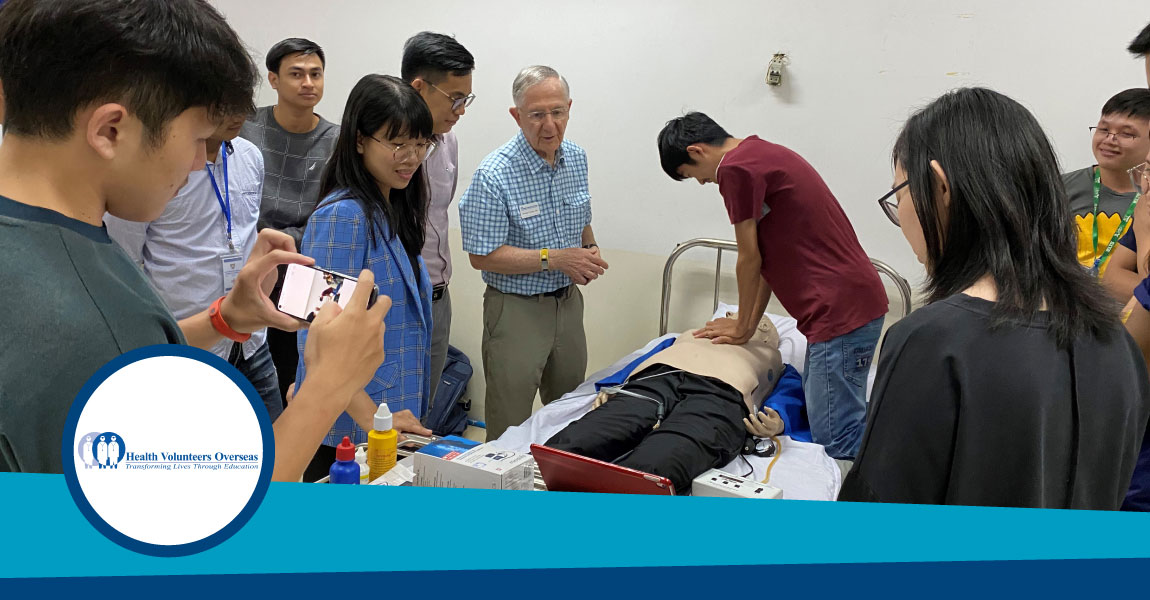At Health Volunteers Overseas, we often talk about the transformative power of education. Health workers who are given access to hands-on training, resources and mentorship gain the confidence and skills needed to better serve their patients. We know that well-trained, skilled and motivated health care providers are essential to ensuring quality health care for everyone, wherever they live.
That is why, for more than three decades, our organization has improved the availability and quality of health care through the education, training and professional development of the health workforce in resource-scarce countries.
Featured Guest:
Beth McNairn,
Deputy Director
Health Volunteers Overseas
Approach to Collaboration
At Health Volunteers Overseas (HVO), collaboration is in our DNA. Since our inception more than 30 years ago, our model has been set up to collaborate on several levels – individually, institutionally, and beyond.
On an individual level, we achieve our goal of improving the quality and accessibility of health care by collaborating with health professionals who provide teaching, training, and mentorship overseas for local health workers or students in medicine, nursing, dentistry, and physical therapy. These individual clinicians volunteer to work with our projects abroad by training others in a bi-directional and collaborative manner. At an institutional level, HVO works with hospitals, teaching universities, and other partners that are often connected to ministries of health in those countries. We also work with 16 sponsoring organizations such as the American Academy of Pediatrics. As professional associations, based primarily in the US, we set standards and provide continuing education for health professionals in different clinical specialties.
Application of the 9 Considerations for Collaboration
Build Trust
Our partners are our peers. We’re able to foster long-term partnerships by building trust through transparency and by providing feedback loops. Our systems ensure open communication, which furthers equitable partnership and, subsequently, interpersonal trust. When working with a partner institution abroad, we prioritize their training needs and develop a letter of agreement that delineates roles, responsibilities, and mutual programmatic expectations. Our short-term volunteers then implement the project alongside personnel from the partner institution. We employ our monitoring and evaluation systems to collect feedback from our sites and our volunteers after each assignment as well as from project leadership at the end of each year. HVO never ceases to question how we can adapt our partnerships to meet our partners’ evolving needs.
Have a Vision
HVO strives to build health workforce capacity in low resource countries so that all people, everywhere, can access high-quality health care provided by local professionals. We greatly value our partners who work towards this vision with us. Mutual vision is critical for collaboration and encompasses an exchange of “assets.” Our assets include volunteers who introduce new knowledge and skills as they teach, train, and mentor local health care providers and those in training. HVO volunteers gain personal and professional insights from working overseas and many report improvements in their own clinical skills and an expanded understanding of global health challenges in less-resourced settings.
An innovative, multi-stakeholder nurse anesthesia training project at the Angkor Hospital for Children (AHC) in Cambodia illustrates this vision. AHC faculty have provided training to both the University of Pittsburgh and AHC nurse anesthesia students. This training arrangement has not only enabled the AHC team of nurse anesthetists to enhance their teaching skills but also encouraged peer-to-peer exchanges between the US and Cambodian students. AHC faculty also trained a group of nurse anesthetists from the Laos Friends Hospital for Children in Luang Prabang, Laos in a truly regional effort to improve the quality and availability of safe anesthesia care.
Seek to Assure the Success of Your Collaborators
The success of our long-term partnerships is rooted in a history of open and honest communication. With each partnership, we ensure everyone is advancing together and gleaning the benefits they need to achieve their goals. Our collaborations are transformational and not transactional. The social impact we aim for is dependent on everyone’s success.
Take Stock
HVO has stayed true to our mission of teaching, training, and mentoring health care providers for more than 30 years. We don’t offer pharmaceutical provision or equipment, for example, but we sometimes network or partner with groups who can provide and fulfill those aspects of health systems strengthening to our overseas partners. We recognize where our organization’s strengths and expertise lie and remain laser-focused on what we do best – teaching, training and mentoring.
Start Small
HVO works with partners to slowly scale projects to better ensure success and mitigate risk. More than 25 years ago, HVO began a partnership with Jigme Dorji Wangchuck National Referral Hospital in Thimphu, Bhutan by starting small – by addressing their request for training in orthopedics. Today, HVO is providing training in nine different clinical areas including pediatrics, mental health, anesthesia, and internal medicine. By adapting to local priorities, building trust and honing an effective and equitable partnership model, we have been able to expand our efforts in Bhutan successfully.
Fail Fast, and Build Rigorous Feedback Loops
HVO welcomes the positive progression of partnerships we are engaged in, but we also accept the conclusion of those partnerships once goals are achieved or our presence is no longer required. From time to time, despite mutual vision and aligned goals, partnerships are closed due to external factors, such as limits placed upon visas or civil strife, natural disasters or disease outbreaks that impede safe travel to a project site. Sometimes, we explore partnerships that ultimately prove incompatible with our mission. While remaining true to our teaching mission, we are constantly adapting to the training needs and demands expressed by our partners. For example, we now offer longer-term volunteer assignments (that include a stipend) to help our partner sites tackle complex training needs. And, we have formalized remote volunteering so that we both encourage and capture the impact of volunteers who continue to mentor site-based personnel and students long after they have left the country. We’ve evolved while still maintaining our primary modality – teaching and training.
Take a Portfolio Approach
Sound systems, clearly defined roles, volunteer leadership, and good stewardship of limited financial resources allow HVO to manage a portfolio of collaborations at varying scales. We’ve devised an evaluation system and feedback loop from HVO volunteers and partners that ensure periodic review and revision of project goals and activities. We have various manuals that define our leadership roles clearly, guiding the highly committed volunteers who contribute their time and expertise to keep our projects moving forward. Each project has an onsite coordinator who is a specialist in that field, and each of our program areas has a steering committee. We then work closely with our sponsoring organizations such as the American Association of Colleges of Nursing to advertise those programs and garner more volunteers. We’re able to achieve our goals and improve our programs when these key elements align.
Consider Non-traditional Partners
Over the years, HVO has had the opportunity to expand our collaborations with non-traditional partners. These collaborations, which extend beyond our established collaborations with professional associations and overseas health institutions, develop organically when interests and common global health goals overlap. For example, HVO is partnering with the World Telehealth Initiative, which is providing telehealth robots and ongoing technical support to several of our sites. Volunteers can work with sites remotely to support training and provide case consultation. We’re also working with Doximity, a network for health professionals, to expand outreach to potential volunteers.
Keep Your Donors Apprised of Your Collaborations
As a membership organization that is primarily funded through private resources, donors are invaluable to us. We show how we’re stewarding their resources through a variety of methods. From our written newsletter, the Volunteer Connection, to our e-newsletter, annual report, and social media sites, we prioritize transparency and communication when keeping our members and donors apprised, as they are critical to our mission and our collective impact. We want our donors to know how their contributions enable HVO to address the global health workforce shortage by education, training and mentoring more than 3,000 faculty, clinicians, residents and students in low-resource countries each year.
Future Collaborations
We value collaborative, equitable partnerships. Our ideal collaboration would increase our impact and social good. We’re open to multi-stakeholder initiatives, perhaps in rehabilitation or other areas, new clinical areas and opening projects in new countries that will allow us to realize our vision of a world where all people have access to quality health care delivered by local health professionals.
HVO also seeks to advance the global dialogue around strengthening health workforce capacity by promoting sustainable global partnerships and supporting ongoing research around global health collaboration. In 2018, we worked with Frontiers in Public Health to publish an eBook on research on collaborative models of education for health workforce capacity building. The eBook includes 163 authors from 28 different countries and 96 institutions, sharing their experiences of teaching and training. It can be found on our website, www.hvousa.org.
This article was composed by Rachel Romana Liu.


